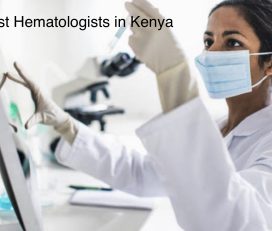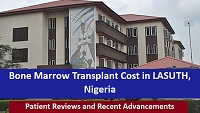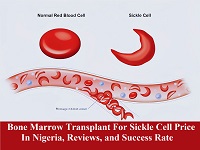
Hematology in Kenya –
What is Hematology?
Hematology is the branch of medicine concerned with the study, diagnosis, treatment, and prevention of disorders related to the blood and blood-forming organs.
Hematology in Kenya-
Hematology in Kenya involves the study, diagnosis, treatment, and prevention of blood disorders within the country’s healthcare system. Hematologists in Kenya work to address a wide range of conditions affecting the blood and blood-forming organs, including anemia, hemophilia, leukemia, lymphoma, and various clotting disorders.
Looking for Best Hematologists in Kenya?
We’ve got you covered,This article serves as a valuable resource to help you locate the best hematologists in Kenya. Whether you’re seeking expert care for a blood disorder or in need of specialized treatment, the information provided here will guide you in identifying skilled hematologists who can offer comprehensive care and support.
Price Range for various Hematology Procedures in Kenya –
The price range for hematology services in Kenya can vary depending on several factors, including the type of test or procedure required, the healthcare facility’s location and level of specialization, and whether the patient is accessing public or private healthcare services.
| Hematology in Kenya | Average Cost in USD | Average Cost in Kenya Shillings (KSh) |
| Allogenic Bone Marrow Transplant | $38,000 | KES 6,080,000 |
| Aplastic Anemia | $3,000 | KES 480,000 |
| Autologous Bone Marrow Transplant | $25,000 | KES 4,000,000 |
| Blood Cancer Treatment | $3,800 | KES 608,000 |
| Bone Marrow Transplant (BMT) | $33,000 | KES 5,280,000 |
| Fanconi Anemia | $3,600 | KES 576,000 |
| Leukemia Treatment | $7,500 | KES 1,200,000 |
| Lymphoma Treatment | $7,800 | KES 1,248,000 |
| Multiple Sclerosis | $6,500 | KES 1,040,000 |
| Myeloma Treatment | $5,000 | KES 800,000 |
| Pediatric Bone Marrow Transplant | $32,000 | KES 5,120,000 |
| Sickle Cell Disease | $3,900 | KES 624,000 |
| Thalassemia Transplant | $6,700 | KES 1,072,000 |
Types of Haematology procedures performed in Kenya-
- Allogeneic Bone Marrow Transplant: A procedure where healthy bone marrow stem cells from a donor are transplanted into a recipient to replace damaged or diseased marrow.
- Aplastic Anemia: A rare condition where the bone marrow fails to produce enough blood cells, leading to fatigue, infections, and bleeding.
- Autologous Bone Marrow Transplant: A procedure where a patient’s own healthy bone marrow stem cells are collected, stored, and then transplanted back into the patient after high-dose chemotherapy or radiation therapy.
- Blood Cancer Treatment: Treatment strategies for various types of blood cancers, including leukemia, lymphoma, and myeloma, which may include chemotherapy, radiation therapy, targeted therapy, immunotherapy, and stem cell transplantation.
- Bone Marrow Transplant (BMT): A procedure to replace damaged or diseased bone marrow with healthy stem cells, which can be allogeneic (from a donor) or autologous (from the patient).
- Fanconi Anemia: A rare genetic disorder that leads to bone marrow failure, physical abnormalities, and an increased risk of cancer.
- Leukemia Treatment: Treatment for cancer of the blood or bone marrow, which includes chemotherapy, targeted therapy, radiation therapy, immunotherapy, and stem cell transplantation.
- Lymphoma Treatment: Treatment for cancer of the lymphatic system, which includes chemotherapy, radiation therapy, targeted therapy, immunotherapy, and stem cell transplantation.
- Multiple Sclerosis: A chronic autoimmune disease that affects the central nervous system, leading to symptoms such as fatigue, difficulty walking, numbness or weakness, and vision problems.
- Myeloma Treatment: Treatment for cancer of the plasma cells in the bone marrow, which includes chemotherapy, targeted therapy, immunotherapy, radiation therapy, and stem cell transplantation.
- Pediatric Bone Marrow Transplant: Bone marrow transplantation specifically for children, which may be necessary for various conditions such as leukemia, aplastic anemia, or genetic disorders.
- Sickle Cell Disease: A genetic blood disorder characterized by abnormal hemoglobin that causes red blood cells to become rigid and sickle-shaped, leading to pain, anemia, infections, and organ damage.
- Thalassemia Transplant: Treatment for thalassemia, a genetic blood disorder characterized by reduced hemoglobin production, which may require bone marrow transplantation to replace defective stem cells with healthy ones.
Services and Procedures offered by Hematologists –
- Angiosarcoma
- Basal cell carcinoma
- Benign Tumors
- Biochemistry
- Blood Transfusion
- Cancer Pain
- Cancer Screening
- Carcinoid
- Cervical Cancer
- Chemotherapy
- Cholangiocarcinoma
- Chondrosarcoma
- Eosinophilia Treatment
- Giant Cell Tumour Treatment
- HPV Vaccination
- Haemophilia
- Human Papilloma Virus – HPV
- Immunity Therapy
- Intensity Modulated Radio Therapy (IMRT)
- Lumpectomy
- Lymphactic drainage
- Malignancy
- Masectomy
- Melanoma Treatment
- Neuroblastoma
- Oral Cancer Treatment
- Osteosarcoma Treatment
- Pap Collection
- PICC Line Insertion
- Sentinel Node Biopsy
- Sinonasal Malignancies
- Splenectomy
- Stem Cell Therapy
- Stem Cell Transplantation
- Stereotactic Body Radio Surgery (SBRT)
- Stereotactic Radio Surgery (SRS)
- Stereotactic Radio Therapy (SRT)
- Treatment of Central Nervous System Tumors
- Tumor Celar
- Tumors and Cysts
- Thalassaemia
Qualifications of a Hematologist in Kenya –
If you are looking for best hematologists here are some Qualifications required to become a hematologist in Kenya –
- Bachelor of Medicine and Bachelor of Surgery (MBChB) Degree: Completion of a five or six-year undergraduate medical degree program from a recognized medical school in Kenya or abroad.
- Internship: After obtaining the MBChB degree, graduates must complete a one-year internship at a recognized hospital to gain practical experience in various medical specialties, including internal medicine and pediatrics.
- Registration and Licensing: Graduates must register with the Kenya Medical Practitioners and Dentists Council (KMPDC) and obtain a medical practicing license to legally practice medicine in Kenya.
- Residency Training: Hematology training in Kenya typically begins after completing a residency program in internal medicine or pediatrics, which lasts for three to four years. During this residency, trainees receive broad-based clinical training in medical specialties.
- Fellowship Training: After completing residency, aspiring hematologists undertake further specialized training in hematology through a fellowship program. This fellowship training usually takes two to three years and provides focused education and clinical experience in the diagnosis, treatment, and management of blood disorders.
- Board Certification: Although not mandatory in Kenya, hematologists may choose to pursue board certification in hematology through examinations conducted by professional organizations such as the East, Central and Southern Africa College of Physicians (ECSACOP) or international boards.
- Continuing Medical Education: Hematologists are encouraged to engage in continuing medical education activities to stay updated on the latest advancements, research, and treatment options in the field of hematology.




